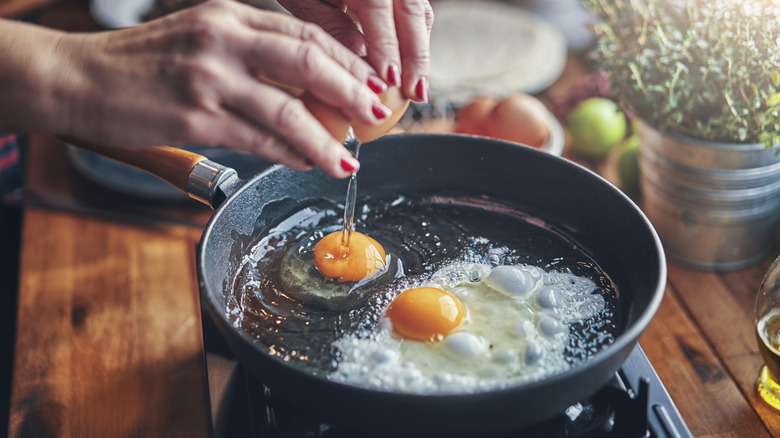The Best Temperature For Frying Eggs Depends On How You Like Them
Eggs are one of the most customizable foods in the world, and while we all may have a preferred recipe for scrambled eggs or a specific way we like to boil them, frying eggs gives you a lot of choices, too. Eggs are delicate things that can completely change their form with only slight adjustments in temperature and the cooking surface used. This can be frustrating when leaving the heat a little too high results in rubbery overcooked eggs instead of something creamy and tender, but it also means that you have a lot of power to fine tune the various egg preparation methods to your exact specifications. The reality is that there is no one perfect way to cook an egg. Everyone has their own personal preferences, and your love for a runny yolk may not extend to everyone at the table.
So, Tasting Table reached out to an expert, Nelson Serrano-Bahri, Chef and Director of Innovation at the American Egg Board, to ask about the best temperatures for frying eggs. According to him, everything comes down to your preferred texture when choosing how you like your fried eggs. If you are aiming for a perfectly cooked, tender texture, he recommends a medium-low heat. He explains that "This allows the egg to set gently without becoming too rubbery, while keeping the yolk runny and creamy." He notes that a lower temperature also promises an evenly cooked egg, adding that it "minimizes the risk of browning and burning the whites."
Fine tune your temperature for either tender or crispy fried eggs
While plenty of people like a nice evenly cooked egg, Chef Nelson Serrano-Bahri told us, "I personally love the crispy edge and the browning of the white for a fried egg." He explained that the browning develops a lot more flavor, and that the crisp edges of the fried eggs create a nice contrast with the softer whites. He explains, "To achieve this, you need medium-high temperature and the pan well-heated before you add the egg." It can also help to use some olive oil in the pan you fry the eggs in. If you like the sound of browned, lacy-crispy eggs but still prefer a runny yolk, Serrano-Bahri has another trick he likes to deploy.
He told us, "My secret for keeping the yolk creamy and runny is that I use cold, refrigerated eggs. This allows the yolk to stay nice and runny without overcooking it while the egg white sets." Finally, if you like a really delicate texture for your eggs, Serrano-Bahri says you can cook them slow over a really low heat. However, he does have a warning for this style, telling us, "The egg will likely take longer to set, which can result in the egg becoming dry and rubbery. Additionally, because it takes longer to cook, you might overcook the yolk." So, choose your favorite fried egg and set your stove top accordingly, but always be wary of how easily things can go wrong.

